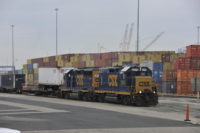The U.S. Environmental Protection Agency has awarded $105 million in grants to states, cities, counties and other localities to improve facilities and other infrastructure needed for their recycling programs.
The awards, which EPA announced on Sept. 13, come from two new programs: $73 million will go to 25 cities and other communities for the Solid Waste Infrastructure for Recycling Grants for Communities program.
In addition, $32 million is from the Recycling Grants for Territiories. They will go to every state, the District of Columbia and U.S. territories to improve their solid waste management planning, data collection and for implementing their recycling plans.
View list of selected projects here.
The maximum amount for the solid waste infrastructure grants is $4 million; the minimum is $500,000.
The state planning grants range from $360,000 to $750,000.
The EPA recycling programs were created under the 2020 Save Our Seas 2.0 Act. But they received a major financial lift from the 2021 Infrastructure Investment and Jobs Act, which provided $275 million over five years for them.
EPA Deputy Administrator Janet McCabe said in a Sept. 12 press briefing to preview the grant selections, "This is EPA's largest investment in recycling in 30 years."
McCabe added, "This will allow resources to be used more efficiently and will reduce the impact that waste materials have on our planet and on the climate."
Of the 25 selected projects for the Solid Waste Infrastructure for Recycling program, about a dozen include new or expanded facilities, according to ENR's count.
Grants for Facilities Projects
Examples of selected facilities projects include: Calabasas, Calif., which was selected for a grant of slightly less than $4 million to design and build an anaerobic digestion facility at its existing landfill.
A nearly $4-million grant is going to Chaffee County, Colo., to design and build a regional transfer station for recyclables and a materials recovery facility.
Iowa City, Iowa, will use its $4-million award to expand an existing compost facility.
Baltimore was picked for a $4-million grant to build a solar-powered, scalable composting facility.
The city of Austin, Texas, was picked for a a $4-million grant to build a new reuse warehouse.
Seattle is receiving $4 million to develop a salvaged-wood warehouse.
Minneapolis will use its $4-million grant to redevelop its North Transfer Station into a residential self-haul, resource recovery and waste disposal site. build a new transfer station on the city's North Side.
Mayor Jacob Frey said in the press briefing that there is a transfer facility on the South Side, but getting there now from the North Side, a disadvantaged community, requires driving across the entire city.
Frey also noted that Minneapolis is contributing $3 million of its own funds to the project.
EPA's McCabe said that more than two-thirds of the funding for the group of selected projects will go toward projects benefiting disadvantaged communities.





Post a comment to this article
Report Abusive Comment